Top 10 Most Popular Juices Right Now
In this post, VINUT will introduce the top 10 most popular juices right now. Let’s take a tour and choose for yourself the best one to try.
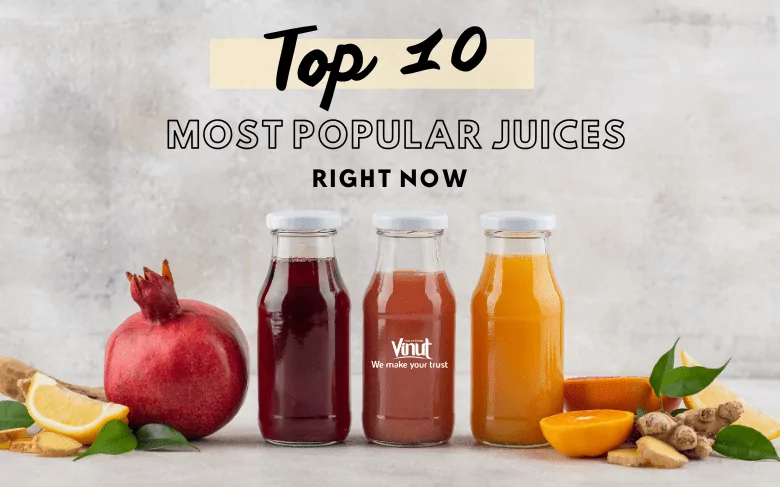
1. Orange Juice
Orange juice is a classic for a reason. The tangy, sweet flavor is refreshing on its own or used in recipes. Orange juice is a good source of:
- Vitamin C – One cup contains over 100% of your daily needs. This important antioxidant supports immune function.
- Potassium – With around 500 milligrams per cup, orange juice helps regulate fluid balance.
- Folate – One cup provides 15% of the RDI of this B vitamin that produces healthy red blood cells.

The pulp provides a moderate source of fiber. Store-bought juice may contain added calcium and vitamin D as well. The downside is it’s high in sugar compared to whole oranges. Some brands also include artificial flavors and sweeteners.
2. Apple Juice
Like orange juice, apple juice supplies vitamin C. One cup has around 14% of the RDI. It’s also a source of the following nutrients:
- Fiber – A cup of apple juice contains around 2 grams of fiber.
- Potassium – With over 200 milligrams, apple juice provides electrolytes.
- Antioxidants – Apple juice contains polyphenol antioxidants like quercetin.
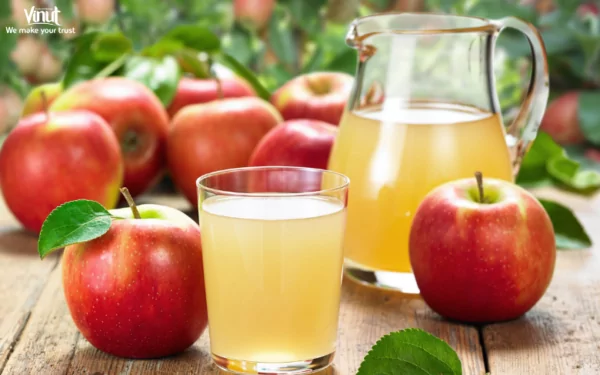
The main drawbacks are the high sugar content and lack of protein and healthy fats. It’s best to consume apple juice in moderation.
3. Cranberry Juice
Cranberry juice is tart with an intense red hue. It provides an impressive supply of vitamin C. One cup contains:
- Vitamin C – Over 20% of the RDI.
- Manganese – Over 20% of the daily value. This mineral is needed for metabolism and bone health.
- Antioxidants – Cranberry juice is one of the highest antioxidant-containing beverages. It has polyphenol compounds like proanthocyanidins.
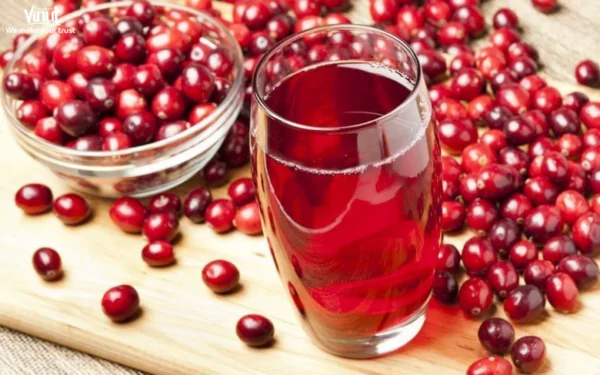
Possible cons are added sweeteners in some bottled cranberry juices. It’s tart flavor may also be unpleasant for some. But overall, cranberry juice is one of the healthier juice options.
4. Mango Juice
Mango juice has a sweet, tropical flavor. It supplies beneficial antioxidants and key vitamins and minerals like:
- Vitamin C – One cup contains over 50% of the RDI for this important antioxidant.
- Vitamin A – Mango is high in beta-carotene, which forms vitamin A. One cup has over 25% of the RDI.
- Potassium – With around 500 milligrams per cup, mango juice aids electrolyte balance.
- Copper – You get around 15% of the RDI of this essential mineral per serving.

Drawbacks of store-bought mango juice can include added sugar. But overall, 100% mango juice makes a nutritious choice.
5. Coconut Water
Coconut water is the clear liquid from the interior of coconuts. It’s become popular due to its hydrating electrolyte content. A cup of coconut water contains:
- Potassium – Over 600 milligrams, which helps replace fluids lost through sweat.
- Magnesium – Around 60 milligrams or 15% of the RDI. This mineral supports nerve and muscle function.
- Sodium – It provides over 250 milligrams of sodium per cup to replenish this electrolyte.

Downsides are that plain coconut water is relatively low in nutrients. But it makes a good post-workout rehydrating drink.
6. Pineapple Juice
Pineapple juice provides a sweet and tart tropical flavor. It supplies various beneficial nutrients like:
- Vitamin C – Over 130% of the RDI comes in one cup.
- Copper – You get around 20% of the daily value per serving, which benefits energy production.
- Manganese – A cup contains around 90% of the RDI, supporting bone health.
- Bromelain – This enzyme in pineapple aids digestion.

The main drawbacks are its sugar content. But overall, pineapple juice is one of the healthier fruit juice options.
7. Peach Juice
Peach juice has a pleasant, mildly sweet flavor. It provides a few key vitamins and minerals, such as:
- Vitamin C – One cup contains over 10% of the RDI.
- Potassium – With around 400 milligrams per serving, peach juice supports fluid balance.
- Fiber – There are around 2 grams of fiber in a cup of peach juice.
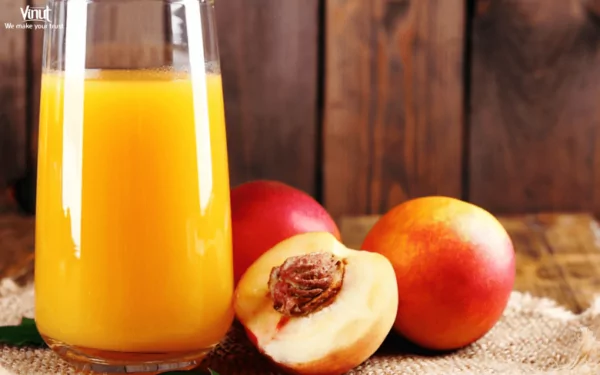
The main downside is that it’s not as nutrient-dense as other fruit juices. Peach juice is also relatively high in sugar calories. But it can add pleasant flavor to juice blends.
8. Blueberry Juice
Blueberry juice is rich in antioxidant compounds that provide deep purple pigments. Key nutrients in blueberry juice include:
- Vitamin K – Nearly a quarter of the RDI comes in a 1-cup serving. This vitamin supports bone and heart health.
- Manganese – With around 25% of the daily value, blueberry juice benefits metabolism.
- Anthocyanins – These antioxidants help reduce inflammation and may benefit heart health.
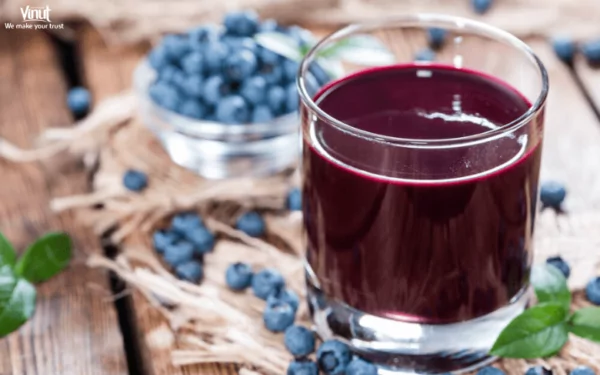
Potential cons are added sweeteners in some products. But overall, blueberry juice is nutritious due to its unique antioxidants.
9. Grape Juice
Grape juice provides a tart, fruity flavor. Concord grape juice offers nutrition in the form of:
- Vitamin C – One cup contains about 25% of the daily needs for this key antioxidant.
- Vitamin K – It provides around 15% of the RDI per serving to support blood function.
- Potassium – With about 350 milligrams per cup, grape juice helps manage fluid balance.
- Antioxidants – Grape juice contains resveratrol and other polyphenols that may help protect cells.

The downsides include high natural sugar. But grape juice remains one of the healthier juice options, especially when 100% pure concord grape.
10. Tomato Juice
Tomato juice makes a nutritious, savory beverage choice. It provides key nutrients including:
- Vitamin C – One cup has over 40% of the daily needs.
- Vitamin A – With over 20% of the RDI, tomato juice benefits vision, immunity and more.
- Potassium – Tomato juice contains over 400 milligrams per serving for electrolyte balance.
- Lycopene – This antioxidant in tomatoes benefits heart health and may lower cancer risk.
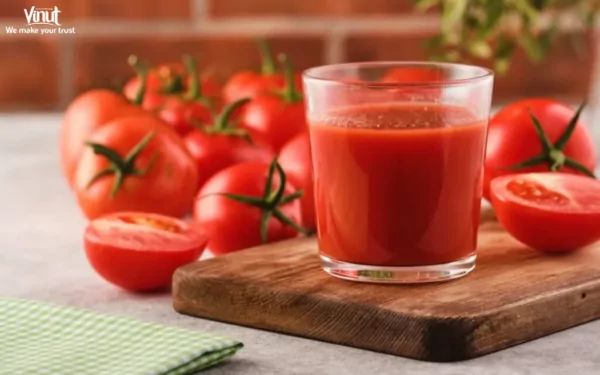
Potential drawbacks are added sodium from canned tomato juice. But freshly made tomato juice packs nutritional value.















